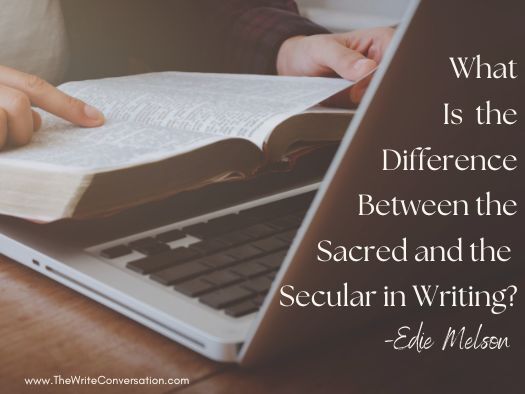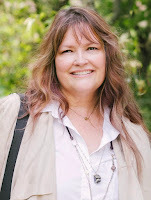What Is the Difference Between the Sacred and the Secular in Writing?

by Edie Melson @EdieMelson
Whatever you do, work at it with all your heart, as working for the Lord, not for human masters… It is the Lord Christ you are serving. Colossians 3:23-24
Even though I’m a Christ-follower, I must admit I'm struggling with a concept.
I have a little bit of an issue with the idea of Christian books and Christian writers. I can hear the gasping and unsubscribing even as I write this. You are welcome to disagree. Actually I hope that you’ll take time to weigh in on this subject. But before you do, let me explain. As far as Christian books, there’s no way a book can be Christian, in that Jesus didn’t die so it could live. It’s like saying I have Christian countertops or a Christian chair. We’ve just become so accustomed to hearing the phrase we accept it at face value.
I get the reason for the distinction. It’s easier for the reader to know the focus and/or content of a particular book if it’s labeled Christian. But, at least in my mind, the distinction is an invisible line. Who decides what is considered Christian and what isn’t? These are some heavy issues, and they’re dogging the Christian publishing industry right now.
I believe the truth of the matter is subjective.
NOT, the truth of who Christ is and what He did for us.
That is a foundational truth we can base our lives upon. The subjective part that I’m referring to is defining what the criteria is that designates a book as Christian. Is it only stories with a gospel message?Is it stories where the characters are believers?Is it only redemptive stories?Is it only nonfiction?Is it biblical fiction?
In the Bible we find all kinds of books, from poetry to biography to a book that never even mentions God (Book of Esther). For years, Christian books have been found in Christian book stores. While I don’t have anything overtly against these stores, I find them to be sanitized places, full of lots of Jesus Junk and very few actual books. They also tend to be extremely female oriented—heavy on the inventory of tea pots, doilies and jewelry. The reason for this feminine focus comes from the argument that most book buyers are women, therefore the shopping experience should be female focused. To me, that’s a self-defeating prophesy because very few men will shop in these girlie-girl surroundings.
But let’s leave this discussion and move to the designation of Christian writers.
It’s easy to ask what makes a writer a Christian, it’s the fact that they’ve accepted Jesus Christ as their Lord. I have no problem with that. But let’s go a bit further. We take it to mean that the so-designated writer, writes only Christian books and/or other Christian content. Again, who decides what is Christian and what isn’t?
Beyond that, what other professions designate themselves as Christian __________? Do we refer to Christian plumbers, or Christian barbers, or even Christian chefs? Do we serve Christian food, live in Christian houses or have Christian plumbing? Of course not. So why Christian books?
To carry this conversation even further—God created the world in which we live. If I'm writing about this world from the viewpoint of someone who believes in God—isn't that Christian?
As a believer, my goal is to write things that won’t shame my Lord. It’s at once that simple and that complicated.
I’ve shared my thoughts, now I’d love to hear yours.
TWEETABLEWhat Is the Difference Between the Sacred and the Secular in Writing? From @EdieMelson (Click to Tweet)
 Edie Melson is a woman of faith with ink-stained fingers observing life through the lens of her camera. No matter whether she’s talking to writers, entrepreneurs, or readers, her first advice is always “Find your voice, live your story.” As an author, blogger, and speaker she’s encouraged and challenged audiences across the country and around the world. Her numerous books reflect her passion to help others develop the strength of their God-given gifts and apply them to their lives.Connect with her on her website, through Facebook, Twitter and on Instagram.
Edie Melson is a woman of faith with ink-stained fingers observing life through the lens of her camera. No matter whether she’s talking to writers, entrepreneurs, or readers, her first advice is always “Find your voice, live your story.” As an author, blogger, and speaker she’s encouraged and challenged audiences across the country and around the world. Her numerous books reflect her passion to help others develop the strength of their God-given gifts and apply them to their lives.Connect with her on her website, through Facebook, Twitter and on Instagram.
Published on February 22, 2025 22:00
No comments have been added yet.



